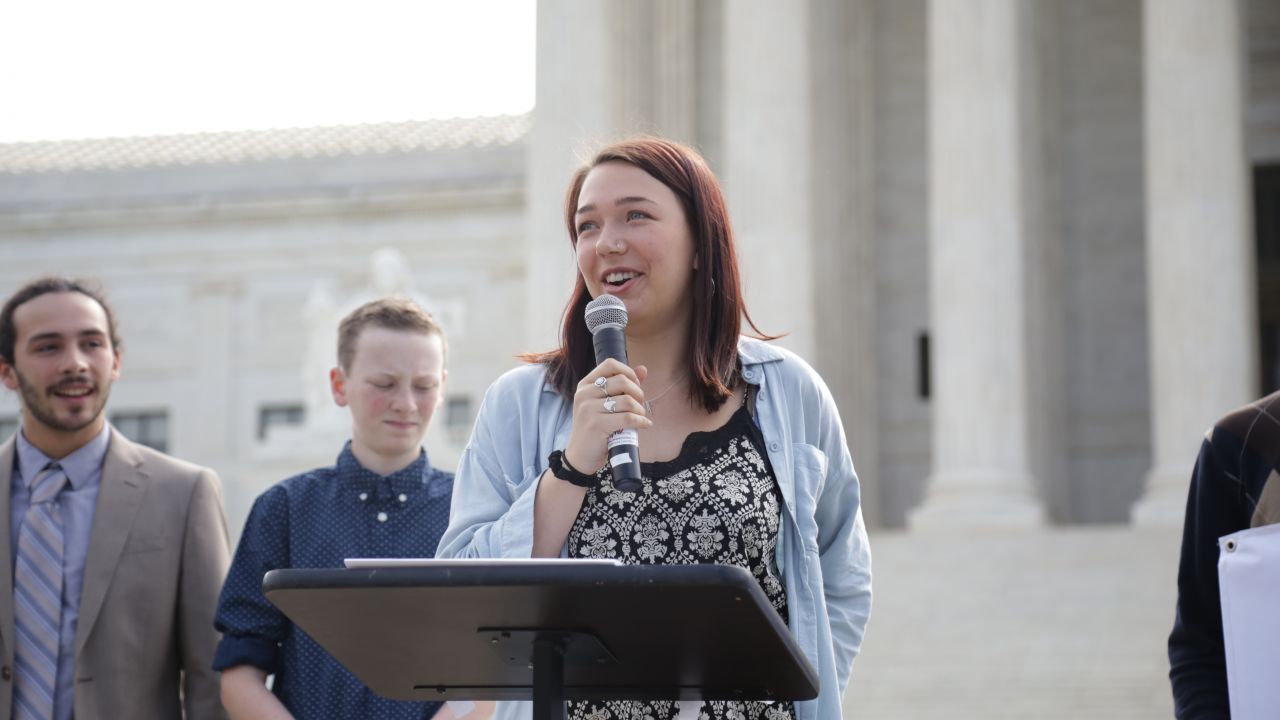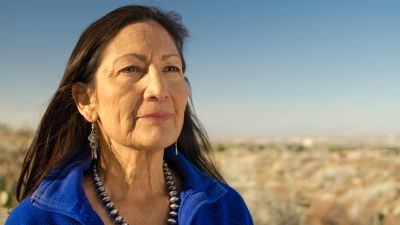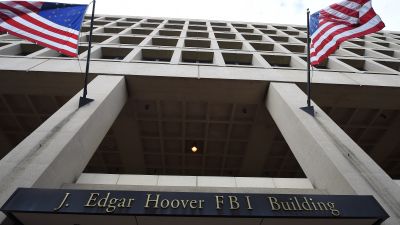
Lead plaintiff Kelsey Juliana, 21, speaks in front of the Supreme Court on April 27, 2017. (Photo by John Light)
Three judges in San Francisco potentially have the power to decide how the US government deals with climate change. Later today, 21 young Americans will make the case that President Trump has endangered their future by aiding and abetting the dirty industries responsible for the global crisis. And they will argue that they can hold him legally accountable.
Trump and his predecessors in the Oval Office, these young Americans claim, have not only let climate change occur, they’ve encouraged it. Despite research going back to the mid-20th century that pumping carbon dioxide into the atmosphere would destabilize the climate, they say the government incentivized the companies that did so through such programs as fossil-fuel subsidies.
Thery further attest that Donald Trump has upped the ante, with his administration outlining plans to lend a helping hand to the coal companies whose CEOs have donated to his campaign — regardless of the dirty fuel’s dim future prospects — and promoting fossil fuels internationally.
The 21 young plaintiffs originally filed their suit against President Obama in 2015, but Trump inherited it, and Justice Department lawyers quickly redoubled efforts begun by the Obama administration to have the case dismissed.
Whether they can will be decided following today’s hearing: A lower court is set to hear the youth’s arguments in February, and the Trump administration has appealed to a higher court, the 9th Circuit, to throw the case out before it goes to trial.
In November 2016, days after the election, District Court Judge Ann Aiken allowed the case to proceed. The Trump administration’s decision to ask a higher court to weigh in is highly unusual.
But so, too, is the young plaintiffs’ suit, which seeks a judicial solution to climate change, a crisis that is growing increasingly urgent and that the other branches of the government have failed to adequately address. The suit argues both that the government cannot put kids in harm’s way by encouraging fossil-fuel production, but also that the earth’s atmosphere is a public trust that the government has failed to protect.
US Deputy Assistant Attorney General Eric Grant, who was appointed to work in the Justice Department’s Environment and Natural Resources Division in April, will be representing the government. Formerly a California-based lawyer, Grant clerked for conservative Supreme Court Justice Clarence Thomas and the late Chief Justice Warren Burger.
Three fossil-fuel industry lobbying groups, meanwhile, have quit the suit. After the young plaintiffs filed their initial lawsuit against the Obama administration in 2015, the American Petroleum Institute, the American Fuel and Petrochemical Manufacturers and the National Association of Manufacturers joined as co-defendants, challenging the case in court. But after November 2016, when a court gave the plaintiffs the green light to proceed to trial, the lobbying groups bailed, claiming that the Trump administration would more adequately defend their interests than the Obama administration.
Interestingly, although Trump himself has spoken extensively of his doubts on climate change (“global warming hoax,” etc.), his legal team assigned to this case has not denied the reality of the threat during recent proceedings. Instead, they’ve sought to wriggle out of the case on the grounds that what the young people are asking for — both in terms of their legal remedy and in terms of discovery — is overly broad. The US may be a rogue state when it comes to climate change — the only one no longer on board with the Paris Agreement — but, the government’s attorneys argue, that’s not their problem. The Constitution, they say, says nothing about climate change.
In its briefing to the court last June, the government wrote:
The Supreme Court has recently emphasized how, under established separation-of-powers principles, Congress, through legislation, defines the EPA’s authorities and duties regarding the control of greenhouse gas emissions, while the executive executes them… There is no room in the constitutional structure for a federal court to take on the role of overseeing the propriety of all governmental actions that may be viewed as contributing to the buildup of CO2 in the atmosphere.
But the government’s approach to the case may change. As E&E News reported earlier this month, the Justice Department has been speaking with scientists who have been critical of the case or who have expressed dissenting views on climate change, which may indicate DOJ lawyers plan to put on trial the science behind climate change.
The suit also comes at a time when the lack of a presidential or legislative response to climate change has made the US unique in a world that has at least acknowledged the necessity of action. As a result, environmentalists and legal scholars alike increasingly look to the courts for a solution. Judge Ann Aiken’s decision to let the suit proceed, days after Trump won election, “was a ray of sunshine in what was a very dark day for the environmental community,” Michael Burger, the executive director of Columbia University’s Sabin Center for Climate Change Law, told BillMoyers.com.
Trump’s climate change-blind policies could “make it more likely the courts will step into this situation,” David Bookbinder, chief legal counsel for the libertarian Niskanen Center, told Bloomberg Environment. Trump’s election, lead plaintiff Kelsey Juliana told us in May, “has really lifted our case up and given our case even more importance and urgency.”
In the short term, it comes down to the three 9th Circuit judges who will hear the case today. Two are Clinton nominees, and the third, Alex Kozinski, is a Reagan nominee. It’s unclear what effect, if any, allegations of inappropriate sexual misconduct by six court staffers against Kozinski, reported by The Washington Post Friday, will have on the hearing.
Correction: This article initially identified acting assistant attorney general and former coal lobbyist Jeffrey Wood as a former DOJ lawyer assigned to the case. While his name was listed on proceedings as the acting head of the DOJ’s Environment and Natural Resources Division, he was not working directly on the case.




